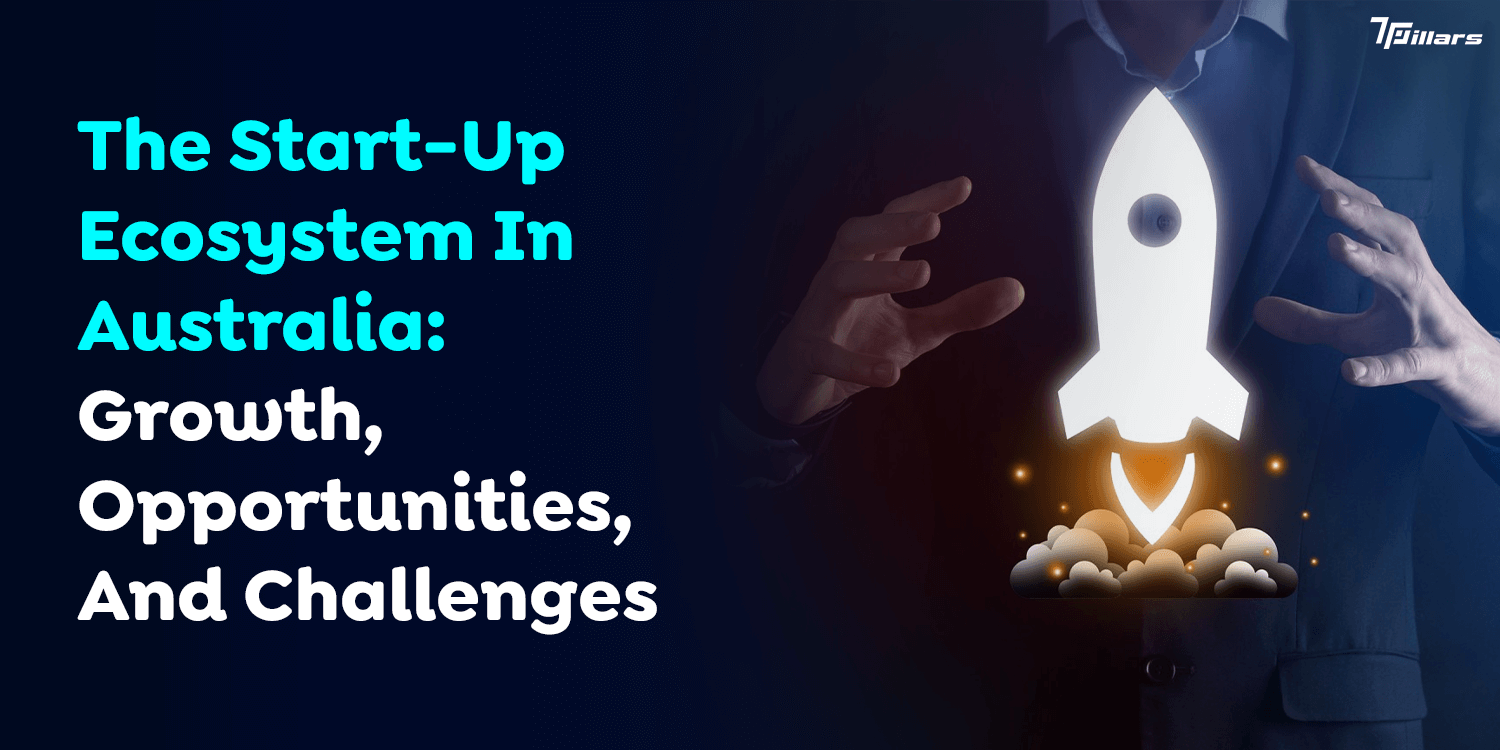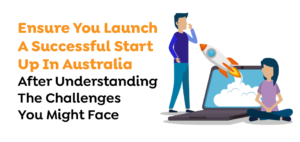Quick Chat
with you!
You have our ear and we can't wait to hear about your idea! Share your details here and we will make sure to schedule a coffee date with you soon.

Has the thought of establishing your business in the growing Australian landscape ever crossed your mind, but you get overwhelmed by the challenges, uncertainties, and risks involved in the process?
Well, you are not alone. Most people desiring to become entrepreneurs share similar concerns about whether they have the right ideas, resources, or skills to be successful. With the right mindset, a solid plan, and the supportive ecosystem in Australia today, it becomes possible to live one’s entrepreneurial dreams like never before. The road may be bumpy, but the rewards will be satisfying.
Today, Australia’s startup ecosystem has grown into a dynamic and vibrant landscape marked by innovation, diversity, and a growing appetite for disruption. Within the last couple of years, the number of start-ups across the fintech, health tech, green energy, and education sectors has grown dramatically.
Not only Sydney and Melbourne contribute to this surge, but emerging hubs in Brisbane, Perth, and Adelaide also make their way onto the world stage.
Most importantly, Australia has developed into a prime place for start-ups because of its strong support network, which includes incubators, accelerators, and government initiatives. The Entrepreneurs’ Programme and the R&D Tax Incentive are pivotal funding sources.
Another driver for this ecosystem’s dynamism is investment. The country increasingly attracts the interest of venture capital firms, angel investors, and crowdsourcing platforms. Atlassian and Canva have inspired a new generation of entrepreneurs through their success stories, giving substantial thrust to the capital inflow in the startup space.
There are challenges to overcome, but regulatory frameworks are just one of a raft of hurdles standing in the way of Australian start-ups if they want to achieve sustained growth—from navigating these to securing the right talent. Yet, this ecosystem’s prospects are enhanced by resilience and adaptability. As we go deep into the granularity of Australia’s startup scene, we realise that this is only the beginning of a journey replete with possibilities and promise. Witnessing the robust development in the start-up sector, several app development companies have dipped their toes into the booming market.
The startup ecosystem of Australia was growing significantly during the years leading up to the COVID-19 pandemic. According to Statista, the number of new ventures in Australia followed a positive trend charged by technological developments, friendly government policies, and a fast-growing entrepreneurial culture. In contrast to the previous several years, more than 12,000 start-ups were operating in Australia in 2019.
Prominent firms such as Atlassian and Canva drove this expansion by becoming the first to achieve success and inspiring a new generation of entrepreneurs to follow in their footsteps.
In particular, the fintech industry grew very fast to become one of the leading new venture industries in the country. Health tech, tech, and renewable energy start-ups also seemed to pick up pace, aligning themselves with global trends toward innovative and clean living.
Before the pandemic, Australia’s startup ecosystem was anchored by a robust network of accelerators, incubators, and co-working spaces, particularly in prime metropolitan hubs like Sydney and Melbourne. Several government initiatives, such as the Research and Development (R&D) Tax Incentive, coupled with funding programs, strengthened the environment in which start-ups operate.
It also invested in start-ups, with venture capital funding in Australia at all-time highs. Growth put Australia on the map as a pivotal player in the global startup environment for investors and talent from Australia and globally.

Start-ups are innovative companies primarily at the early stage of development, defined by the search for a scalable business model, often focused on new technologies, products, or services. In contrast to established enterprises, start-ups aim to create new markets by offering innovative solutions or filling market gaps.
The start-up ecosystem survives on risk-taking, creativity, and agility. The founders of start-ups generally seek funding from venture capital, angel investors, and crowdfunding to feed their growth, as their modus operandi is distinguished by limited resources. Success will be driven for them by rapid experimentation, learning from failures, and a change in strategy in the light of market feedback.
Another differentiating factor about start-ups is the potential for exponential growth. While start-ups are intended to expand quickly and internationally, small enterprises may have a solid but constrained market scope. That growth mindset is often accompanied by innovation, especially in technology, health, or finance.
Due to their dynamic character and a high tolerance for uncertainty, start-ups may be rewarding and challenging. Understanding how innovation, adaptability, and strategic risk management are essential to a start-up’s success is necessary to understand the philosophy of new business ventures.
Australia is witnessing an invigorated surge in start-ups driven by a confluence of factors that have created an incredibly vibrant entrepreneurial ecosystem. The highly responsive nature of Australia attracts innovation and ambitious entrepreneurs willing to tap into new opportunities.
The available capital has easy access due to a supportive group of mentors and industry experts who new ventures can turn to for advice. On the other hand, a rich ecosystem, cultural change toward entrepreneurship, and a skilled talent pool make this scenario more fertile for emerging start-up businesses. All these factors converge to create a dynamic and fast-changing start-up scene in the country.
The government of Australia has been a massive player in ensuring the growth of start-ups through various friendly initiatives. Prime help amongst these are tax incentives like Research and Development Tax Incentives, where large tax offsets accrue to businesses from investments made in innovation and technology.
Other financial support and mentorship extends to emerging enterprises from government grants and funding programs, including the Entrepreneurs’ Program. The program for entrepreneurs.
By reducing the expenses of launching and expanding a new business, policies such as this one aim to encourage entrepreneurship. It indicates that government programs promote a conducive atmosphere to creativity and business, which benefits Australia’s thriving startup scene.
Over the years, the Australian investment ecosystem has posted remarkable growth and maturation. Venture capital firms, angel investors, and crowdfunding platforms have been engaging with a thick network to support start-ups with the much-needed financial backing and resources.
The availability of loans for entrepreneurs to launch and effectively scale up their businesses has significantly improved due to the proliferation of investment opportunities. More available money typically sees start-ups investing in research and development, marketing, and talent for the increase to be much better.
The growing investment environment will help innovate on a new level, set new vigour, and warble the undiscovered melodious song of success among the nascent companies and firms globally. Hire an Android app development company or an iPhone app development company depending on your needs to help you launch the business of your dreams.
The strong pool of talent in Australia can mainly be attributed to its high education level, which focuses on the STEM curriculum. Therefore, within the STEM educational framework, they offer a challenging academic setting that funnels graduates with high technical skill levels and critical thinkers who can fuel innovative practices.
The influx of skilled workers into the workforce is encouraging the creation of new products and services, which will help tech-driven start-ups expand even more. When this hands-on experience is combined with deep domain knowledge, it works to allow Australian start-ups to be global contenders in all areas: attraction of investment, development and bringing new and innovative products to market and help build Australia’s reputation as a technological economy.
It has brought about significant cultural change toward entrepreneurship in Australia, marked by increasing tolerance for risk and a growing percentage of the population moving into start-up ventures. This is due to the heightened legitimacy of entrepreneurial pursuits as alternate careers. The stories of Australian start-ups, now reaching milestones of success and getting global attention, are prime to shifting this change.
They demonstrate the great things that can be done, thus motivating aspiring entrepreneurs to follow suit. This changing mindset is further supported by a more tolerant attitude from society towards innovation and risk-taking, creating a vibrant environment.
Thanks to the rapid advancement of technology, entrance barriers have significantly decreased, making it simple to accomplish rapid business growth. The ease of developing and launching ideas is facilitated by the proliferation of unique digital tools and platforms. Technology-enabled e-commerce platforms make it easier to do business online, while advanced app development frameworks make it easier to create software.
Digital marketing tools increase your visibility and customer engagement since they provide cost-effective ways to reach target customers. This technological evolution enables start-ups to scale their businesses effectively, respond to changing market conditions, and compete with many more on the global stage.
Australia stands to benefit from robust trade relations and strategic geographic location near Asia, becoming truly advantageous in accessing international markets for start-ups. Trade agreements between the nation and large economies like China, Japan, and South Korea promote easy access and expansion into these profitable sectors.
Membership in regional economic partnerships, notably the Comprehensive and Progressive Agreement for Trans-Pacific Partnership, further opens doors for Australia in trade. With such proximity, Australian start-ups can take advantage of the fast-growing consumer base in the region and collaborate with regional partners for business operations across borders, hence moving on the fast track of global growth in market reach. An app development company can help you transform your ideas into a reality by helping you make changes to ensure your idea becomes a hit in the market.
In this sense, incubators and accelerators have come to play a fundamentally important role in Australia’s startup scene. Incubators and accelerators provide a great deal of comprehensive support extending beyond money alone. The programs offer continuous and tailored mentorship by experienced industry professionals who nurture entrepreneurs through the formative years of the business.
It allows access to foremost resources such as office space, technologies, and administrative support, without which the start-ups can scale efficiently. These programs network with potential investors, partners, and fellow entrepreneurs for beneficial connections to collaborate. They also allow for business models and strategy refining; therefore, incubators and accelerators increase the likelihood of start-up success and sustainability manifold.

Australia’s Fintech industry indicates a great potential to become one of the leading sectors within the startup ecosystem very shortly, with a highly supportive regulatory environment and strong consumer demand for digital financial solutions. Regulations exist that are sophisticated for the industry, including initiatives such as Consumer Data Right and open banking regulations, thus providing a good level of support and stimulus toward innovation and competition on which fintech start-ups can capitalize.
Companies like Afterpay, Airwallex, and Zip Co have been hugely successful and have driven changes in financial services with their innovative products. Further fuelling the industry’s growth and making Australia one of the significant fintech global hubs today is the rising popularity of neobanks, digital wallets, and blockchain technology.
The Australian HealthTech industry is rapidly growing, underpinned by an increased demand for digital health solutions and giant steps in medical technology. COVID-19 has accelerated change in telehealth services, wearable health devices, and remote patient monitoring. These technologies opened wide avenues for innovation and enhancement of healthcare delivery for health tech start-ups.
Start-ups are innovatively using artificial intelligence, machine learning, and big data to understand improved patient outcomes and optimized workflows of healthcare professionals with tailored care. Companies like Harrison.ai, HealthEngine, and Eucalyptus are at the helm of affairs in this area, developing cutting-edge solutions that change how healthcare services are accessed and delivered.
These innovations not only enhance efficiency and effectiveness in healthcare but some of the core challenges are tackled in terms of accessibility and patient engagement, thus allowing Australia to be at the forefront of the global health tech landscape.
Australia’s ed-tech scene has picked up steam after COVID-19 forced a quick move to online and remote classes. This change has set off a burst of new ideas from start-ups. They’re now coming up with cutting-edge answers to meet the changing needs of students, teachers, and schools. These breakthroughs include learning platforms that adjust to each student’s needs, tutoring systems powered by AI that give custom help, and deep-dive learning experiences using virtual and augmented reality tech.
Australian tech firms like OpenLearning, Cluey Learning, and Go1 lead this change. They’ve gotten significant attention and money for their new ways to improve learning results. These companies use cutting-edge tech and create lively, hands-on learning spaces. This changes how people teach and learn, raising the bar for top-notch easy-to-access education in Australia and globally. A collaborative mobile app development company can help you start a new business venture in no time after analysing the market demands.
Australia’s start-up scene stands out for its quick growth and wide range of chances. The country has become a significant player worldwide, creating a robust setting that helps new ideas and business ventures. What’s behind this success? Government policies that lend a hand, like the R&D Tax Incentive and different funding options, help build a lively start-up community. Leading cities include Sydney, Melbourne, and Brisbane, which attract domestic and international talent with their humming tech hubs and collaborative networks.
Key industries pushing Australia’s growth forward include fintech, health tech, ed-tech, and cleantech. The fintech industry thrives due to solid regulations and high customer interest, with firms like Afterpay and Airwallex showing the way. Healthtech has seen rapid progress thanks to improvements in digital health and AI. The growth is boosted by the move to online classes, and the emphasis on sustainability through cleantech highlights Australia’s dedication to tackling worldwide issues while boosting its economy.

The Australian government has a very open policy to support start-ups through various means, providing a conducive environment for entrepreneurial ventures. Some core elements of this policy include tax support, access to funding programs, and strategic partnerships for innovation promotion.
One more pivotal component is the infrastructure and resources provided by the government for the growth journey of start-ups. By working on a robust system, it guarantees that start-ups have all they need to succeed. This holistic approach aids entrepreneurs in overcoming the challenges their businesses face, scaling, and contributing towards the country’s economic development and global competitiveness.
The R&D Tax Incentive plays a significant role in how the government backs innovation in start-ups. This program gives tax breaks to companies doing R&D work that qualify, which cuts down their costs and helps create an environment where new ideas thrive.
The incentive assists start-ups in innovative products and technology development by providing significant tax savings on R&D spending. This support helps cover the high research and development costs and it pushes start-ups to keep innovating. As a result, they can improve their tech and hold their own in the market.
The Start-up Business Visa is a crucial program from the Australian government aiming to draw in entrepreneurs globally and boost global teamwork. This visa lets foreign entrepreneurs set up and run new businesses in Australia, making it easier to break into the Australian market. By going after top talent worldwide, the program wants to add fresh viewpoints and cutting-edge ideas to the local start-up scene.
It gives international entrepreneurs a chance to tap into Australia’s business-friendly setting and help create partnerships across borders, giving Australian start-ups more room to grow and reach out. This program plays a big part in ramping up the country’s ability to innovate and compete on the world stage.
The Early-Stage Innovation Companies tax incentive program is one strategic initiative to promote investment in early-stage start-ups. It encourages investment by providing significant tax benefits to investors who offer capital to such innovative companies in their early stages, so the risk for the investors gets compensated, making it more attractive to invest in start-ups.
Subsequently, start-ups get critical funding, which could be transformational, scaling operations, furthering product development, and enhancing market reach if available. In addition to boosting investor confidence, the ESIC program fosters innovation and expansion within Australia’s startup scene.
Government-backed accelerators and incubators will play a significant role in early-stage start-up development. These incubators and accelerators provide holistic support to early-stage start-ups and help them grow. Accelerators like CSIRO ON Accelerator, Startmate, and the Melbourne Accelerator Program provide an organized environment for start-ups to access expert mentorship, strategic guidance, and other primary resources.
Many of them include access to funding, networking, and specially designed workshops that answer the specific needs nascent companies may have. These incubators and accelerators provide dedicated support and encourage collaboration, which becomes the key to fine-tuning their business model, accelerating growth, and rising more likely to ensure long-term success in the market.
Government grants and funding programs across industries are instrumental in supporting start-ups, and many more by providing financing support. In this respect, programs like the Entrepreneurs’ Programme, the Business Growth Fund, and the Advanced Manufacturing Growth Fund are set up to drive innovation and growth.
Distinctive financial support provided to start-ups under these initiatives would enable them to invest in research and development and scale up operations, thus creating new jobs. Grants and funding programs bring a level playing field for start-ups versus existing ones, break the financial barrier, and aid in economic development and job creation by catering to special needs in some sectors.

Australian start-ups face several challenges, from limited access to capital to acute competition for skilled talent. Due to the tiny size of the local market, worldwide expansion becomes necessary, involving some complex legislation. Geographical isolation has the disadvantage of making networking and investment opportunities more awkward compared with countries situated near the hubs of technology.
While recent improvements in funding availability have been made, access to capital is and will probably remain the biggest challenge to business plans for many Australian start-ups, particularly during the early development stages. In other words, even though venture capital investment has appreciably grown, it is still concentrated in areas like fintech and health tech, making other sectors disadvantaged.
It means that firms outside these high-profile sectors often find it hard to get appropriate funding for scaling operations and getting growth. This consequently binds their innovation potential, scaling up, and competitive performance in the marketplace—it underlines the need for better and all-inclusive investment opportunities across the start-up ecosystem.
One of the biggest problems facing Australian start-ups has remained attracting and keeping top personnel, especially in competitive fields like software development, data science, and artificial intelligence. Intense competition for skilled employees usually leads to a lack of technical skills; this may become a barrier to the growth and scaling of start-ups.
The speed at which start-ups can create and implement new technologies will be impacted by a lack of talent, which will also affect their ability to innovate and stay competitive. As such, start-ups need to overcome these issues and balance them with their ultimate need of creating and holding a good, proficient team that will carry them through to success.
The small domestic market in Australia is one of the significant possible limitations to targeting high growth among start-ups in Australia. While the country offers an excellent platform for testing and launching new products, the small size usually demands international expansion of start-ups. This implies entering new foreign markets, negotiating complex regulatory environments, and establishing networks, which can be very difficult and resource-intensive.
In other words, scaling up calls for rather careful entry strategies into new regions; business models and operations are adjusted in line with the diverse market demands and regulatory environments of the markets, thus surmounting the barriers to accessing better and more lucrative global opportunities.
The interaction with the multi-faceted Australian regulatory environment has, therefore, been identified as a prime challenge that start-ups face in strongly regulated industries such as fintech, health tech, and cleantech. These consist of adherence to local laws and regulations, obtaining the correct licensing, and compliance with complicated bureaucracy. These can be time-consuming and expensive, drawing resources and focus from the core business.
Moreover, the regulatory environment is dynamic, thus adding to the complexity of requirements for start-ups to keep themselves updated and act fast. For a business venture to function lawfully, lower risks, and gain the confidence of investors and customers while growing a firm, it would be imperative that it be able to get over these regulatory obstacles.
The geography of Australia creates opportunities but also significant challenges for start-ups. Being close to some of the world’s fastest-growing economies in Asia can help with consumer targeting and strategic alliance formation. Its relative distance from key global tech hubs like Silicon Valley or London could act as a deterrent to building international networks and attracting investment.
Isolation could mean being out of the line of vision of global trends and innovation, and therefore investors’ eyeballs, leading to slow growth. In addition, cultural and time zone differences are other challenges to international collaborations, which complicate matters further in fitting Australian start-ups into the global ecosystem.
Hitting the global arena, therefore, is one of the growth strategies executed by many Australian start-ups. With strong trade relationships, proximity to Asia, and other growing markets, start-ups can bridge into foreign markets to scale their operations. Initiatives at the government level, such as the Global Innovation Strategy and the Export Market Development Grant, or EMDG program, also foster overseas expansion among start-ups.
Corporate partnerships can be an enormous trigger of growth and offer great access to resources, expertise, and customers for start-ups. Large corporations in Australia are actively seeking collaboration with start-ups to drive innovation and remain competitive in their respective industries.
The rapid rate of technological innovation creates endless opportunities for Australian start-ups to disrupt industries and innovate new markets. Some of the rapidly emerging technologies include artificial intelligence, blockchain, quantum computing, and the Internet of Things, which open a plethora of possibilities for start-ups within even the most diverse sectors.
The most outstanding feature of the Australian start-up ecosystem is that it holds a wide and multicultural population. Start-ups embracing the concept of diversity and inclusion would be more suitably positioned to understand and serve the needs of diverse customers and markets. Moreover, efforts toward more significant representation of gender and underrepresented groups in entrepreneurship are linked with the enhanced potential for additional innovative and successful start-ups.
The fact that sustainability has become an increasingly important aspect of consumers’, investors’, and governments’ focus means that start-ups focusing on sustainable business models and environmentally friendly solutions will be in a strong position to do well. With the rising demand for clean energy, circular economy solutions, and sustainable products, opportunities are created for start-ups to be at the forefront of making a more sustainable future.

The outlook on the future of Australia’s start-up ecosystem is optimistic, with further growth and innovation. Continued government support for innovation, together with growing demand for digital solutions and sustainable practices, will be the drivers for the next wave of startup success stories in Australia.
It will have to answer critical challenges such as better access to capital, attracting and holding the best talent, and improved human diversity, and inclusion. Government, industry, and academia must all work in concert if conditions that allow start-ups to flourish and drive Australia’s economic growth and global competitiveness are to be created.
Australia’s start-up ecosystem has fine positioning to leverage emerging trends and opportunities, from FinTech and HealthTech to sustainability and global expansion. Continuing to support innovation and entrepreneurship, Australia could cement its position as a leading global start-up hub.
From humble beginnings, Australia’s startup ecosystem has grown into a significant contributor on the global stage. With governmental support, collaboration, and innovation across all sectors, Australian start-ups are well-placed to be one of the drivers of economic growth with lasting impact.
7 Pillars, a brilliant mobile app development company, can help you build your dream start-up app that will be an instant success among users after analysing the current market trends. So, if you are an entrepreneur looking to develop a start-up app, then look no further and contact our team at 7 Pillars today.
There are challenges, but the opportunities for growth and global expansion are vast in their numbers. The future remains bright for entrepreneurs and innovators as Australia continues to foster its startup ecosystem.
7 Pillars, a brilliant mobile app development company, can help you plan and start your start-up within your budget. At 7 Pillars, a leading mobile app development company, our technocrats are experts in harnessing the latest technologies, so our client’s software enhances project efficiency, facilitates informed decision-making, and enhances operations. If you plan to start a new business venture, then look no further and contact our team at 7 Pillars, one of the best app development companies today to turn your ideas into a brilliant reality.